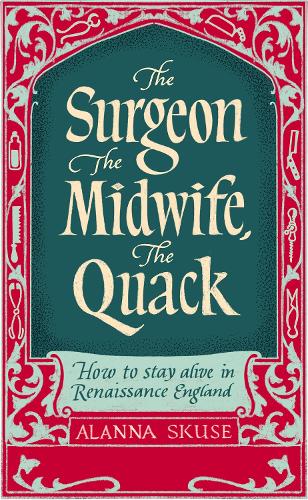
The Surgeon, The Midwife, The Quack: How to Stay Alive in Renaissance England
(Hardback)
Publishing Details
The Surgeon, The Midwife, The Quack: How to Stay Alive in Renaissance England
By (Author) Dr. Alanna Skuse
Oneworld Publications
Oneworld Publications
3rd February 2026
16th October 2025
United Kingdom
Classifications
General
Non Fiction
History
European history: Renaissance
History of science
Gynaecology and obstetrics
Womens health
General surgery
Magic, alchemy and hermetic thought
History: plagues, diseases, famines
Physical Properties
Hardback
384
Width 135mm, Height 216mm, Spine 33mm
Description
Discover the remarkable birth of modern medicine.
When we imagine Renaissance medicine, the clich is dreadful unsterile instruments, a total lack of anaesthetics and shocking levels of infant and maternal mortality. And thats before you get into astrology, bloodletting and a litany of bizarre treatments, more likely to kill than cure
As ever, the true picture is somewhat different. Here, in the sixteenth and seventeenth centuries, modern medicine began to take shape. Medical education was being formalised for the first time. Through dissections and hands-on experience in war, surgeons were documenting the intricacies of the human body and distributing their work across the continent. And, as European powers expanded their reach into the New World, new medicines and treatments were being discovered and cultivated.
Historian Alanna Skuse ventures into the bustling medical marketplace of Renaissance England a world of travelling surgeons, prosthetics craftsmen, faith healers and, of course, snake oil salesmen. Theres the domestic healer, her kitchen stocked with all manner of herbs, tonics and elixirs, ready to dole out to ailing neighbours; the expert midwife, called upon when the physician and surgeon failed; the trusted apothecary, shop stocked with remedies for every ailment and ingredients from each corner of the globe. Humane and entrancing, Surgeon, Scholar, Chemist, Quack reveals the miraculous birth of modern medicine.
Author Bio
Dr Alanna Skuse is a literary scholar, historian and author with a focus on stories about medicine, bodies, and Renaissance England. She teaches literature as Associate Professor at the University of Reading and has published academic books and articles on the history of cancer, surgery, disability, Shakespeare and self-harm. She also runs public history projects, and writes and broadcasts for BBC Radio, Wellcome Stories, the Conversation and History Today.
